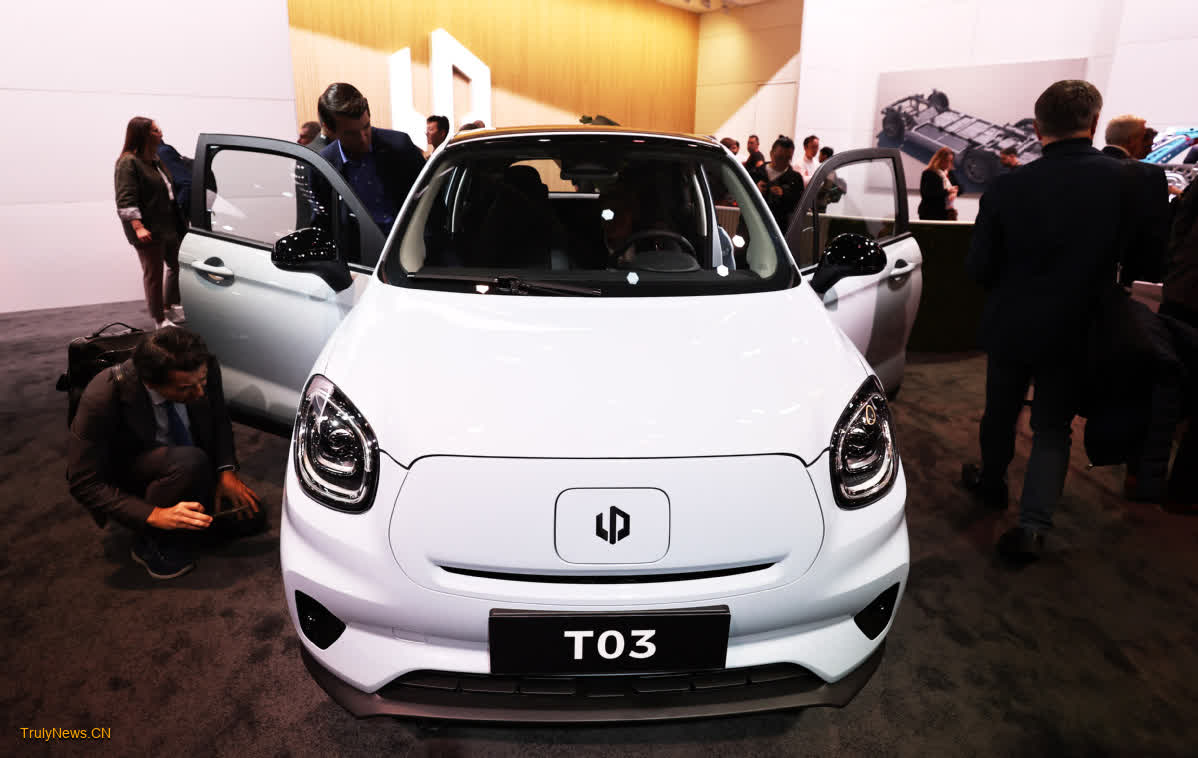
Chinese automakers took center stage at the Paris Motor Show with their cutting-edge new energy vehicles, showcasing their determination to venture into European markets despite the possible imposition of hefty tariffs on China-made electric vehicles.
The biennial show, which traces its history back to 1898, concluded on Sunday. It saw a resurgence compared to 2022, which saw the absence of major international automakers such as Volkswagen, Toyota and BMW. Similarly, Chinese automakers once again outnumbered participants from other countries, with nine companies taking part.
China’s largest NEV maker, BYD, launched the Sea Lion 07 at the event, a mid-sized SUV that aims to compete with Tesla’s Model Y.
BYD has launched eight models in European markets and plans to launch six more in the next 14 months, showing its determination to expand its presence in the European market.
Shu Youxing, general manager of BYD’s European sales division, said BYD debuted in Europe at the 2022 Paris Motor Show with three models. Just two years later, it has introduced eight models.
BYD has prioritized European market demand to offer consumers a variety of options for electric travel, Shu said.
Chinese NEV maker Seres made the overseas premiere of its Aito brand, co-developed with tech giant Huawei, at the Paris event. It featured its complete lineup of M5, M7 and M9 SUVs.
One of the exhibits, an M9, was part of the Aito’s Eurasian tour, which traversed 12 countries in a 38-day journey covering approximately 15,000 kilometers from its production site in Chongqing to Paris.
Aito said its driving-assisted technology covered more than 8,800 km of the tour, representing nearly 60 percent of the total distance driven.
“Such a special way to participate in the Paris Motor Show aims to validate the stability and reliability of the products’ long-distance intelligent driving,” said Li Bo, vice-president of Aito’s business group, quoted by Chinese news outlet Yicai.
The trip also offered the opportunity to showcase intelligent driving features to customers in countries along the route, conducting face-to-face market research, which helps in understanding user interest and expectations regarding intelligent driving, Li added.
Chinese EV startup Xpeng began presales of the P7+ sedan at the Paris event, with a starting price of 209,800 yuan ($29,445) but did not disclose the European price.
Xpeng stated that Europe is an important market for its development and it will bring more new products and continuously improve its after-sales network and service quality in the market.
The startup also announced plans to enter more than 60 countries and regions globally by 2025, aiming for overseas sales to account for half of total sales in the next decade.
Unlike other Chinese brands, Leapmotor has sold its models — the C10 SUV and T03 supermini — in 13 European markets through its joint venture with Stellantis since September.
At the show, Leapmotor CEO Zhu Jiangming, Stellantis CEO Carlos Tavares and Leapmotor International CEO Xin Tianshu unveiled the first global model of the new B-series, the B10 SUV. Targeting the 100,000 to 150,000 yuan segment, which is the most competitive due to it having the largest market share, the model aims to help the automaker boost sales. The automaker will also launch three B-series global models in 2025.
According to Xin, Leapmotor International has more than 200 dealerships across the 13 European countries. The JV is expected to have 350 sales outlets operational in Europe by the end of this year and 500 sales points by the end of 2025.
As the world’s second-largest EV market behind China, European EV sales have declined for four consecutive months. In August, sales plummeted 43.9 percent year-on-year, according to Dataforce.
Renault CEO Luca de Meo said due to factors including inadequate charging infrastructure and price fluctuations, the EV market in Europe is not favorable. Renault and its subsidiaries are working on cost reductions and price adjustments to attract more consumers.
The French automaker unveiled its new compact electric car, the R4 E-Tech, at the motor show, expected to be priced at less than 35,000 euros ($38,000).
Other traditional automakers also launched lower-priced entry-level EVs to attract customers. Volkswagen showcased its compact ID. 2all concept car, which is expected to be launched by the end of 2025 at a price below 25,000 euros. And its Skoda brand showcased the plug-in hybrid Elroq SUV for 33,000 euros.
Stellantis’ Citroen showcased its electrified portfolio at the event, including the affordable C3 supermini and C3 Aircross compact SUV, which priced at 23,000 euros.
German premium automaker BMW showcased more than 15 electric models bearing the BMW and MINI logos at the Paris show, which represents its most complete EV lineup. In the spotlight are the BMW Vision Neue Klasse sedan and the BMW Vision Neue Klasse X SUV, which are making a joint public appearance for the first time.
BMW said that these concept vehicles are poised to redefine the BMW brand as a pioneer of innovation, with its groundbreaking features being incrementally applied across all future BMW models.